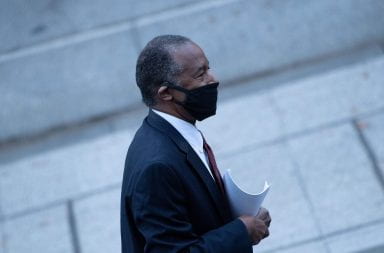
Herb Asher, professor emeritus of political style, talks about President Donald Trump’s administration at a forum held at Page Hall on Jan. 31. Credit: Summer Cartwright | Senior Lantern Reporter
Dialogue, a monthly discussion series sponsored by the John Glenn College of Public Affairs, kicked off its 2017 session focusing on the current presidential transition on Tuesday.
The conversation was moderated by Trevor Brown, dean of the Glenn College, and included input from Herb Asher, a professor emeritus of political science, and focused on topics ranging from President Donald Trump’s governing style to the government at large, as well as the media.
Asher began the dialogue analyzing the past 11 days Trump has been in office. He said the current administration’s campaign mindset, and what he called a lack of appreciation for various facets in government, could eventually hurt the administration’s credibility.
“You start hoping that at some point there will be a learning curve that demonstrates a greater appreciation for the governing process, greater appreciation for the government, greater appreciation for the legitimate role of the media,” Asher said. “But I’m not sure how quickly we’re going to get there.”
While the Trump administration has had its share of controversy, this past week specifically, Asher noted that previous transitions have also been met with tension, specifically as a result of the politically dividing campaigns they sprouted from.
He said that, in recent elections, campaigns have created more division and dissension, as well as trivialized many issues, resulting in a rough transition from working for votes to working for government.
“And then when the campaign is over, people then say, ‘Well, now it’s time to govern,’ but often times the people that were involved in the campaign — some of whom are brought into government — don’t know the first thing about governing,” Asher said.
Some in the Trump administration still have an us-versus-them mentality, Asher said.
“And the ‘them’ could be democrats, the media, the newspapers, whatever,” he added.
The conversation then transitioned to what the future for public service might be with Trump as president.
“Even when they’re trying to do the right thing, (the media) can get sort of lured into the notion of equivalence.” — Herb Asher, professor emeritus, political science
Brown said that much of the current rhetoric surrounding government employees today could be damaging to the appeal of working in government.
One executive order that Trump recently signed includes a federal hiring freeze. Brown said the agencies most affected by this action still have to continue functioning, regardless of the issue, and the reality of governing will offset some of the effects.
“Already a number of agencies have come forward with exceptions,” Brown said. “Veterans Affairs was the first to come forward with a hundred different employment categories that would be exempted and now several other agencies have followed, as well.”
Many in the audience expressed worry for the future of America’s political status. This future, Asher said, depends on the growing aggressiveness of the media.
He said that in the beginning stages of campaigns, the media had “awful” coverage, but they are getting better at pointing out truth from “alternative fact,” as well as covering Trump’s tweets.
“The most patriotic thing you can do right now is to subscribe to multiple newspapers,” Asher said.
He said that the idea that objectivity means telling multiple sides of each story is wrong, and to combat falsehoods told by candidates and politicians, the media must blatantly state that something is a lie.
“Even when they’re trying to do the right thing, (the media) can get sort of lured into the notion of equivalence,” Asher said.
Asher also said social media will play a dramatic role in future elections.
“Donald Trump has demonstrated that for significant races, like the presidential caucuses, he who tweets first and most outrageously wins the battle,” he said.
The next College of Public Affairs Dialogue will take place in February.


